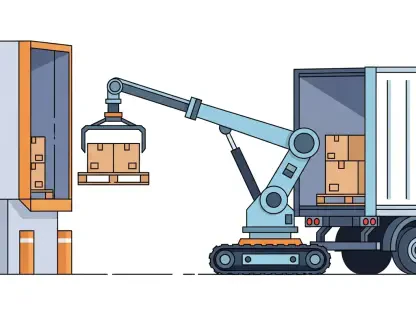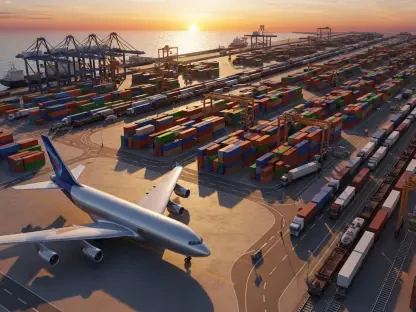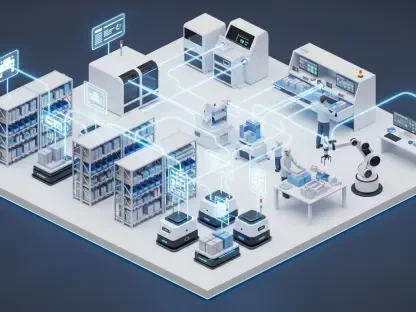Artificial intelligence (AI) has become a significant game-changer in various industries, and logistics is no exception. By deploying AI, enterprises can enhance productivity, efficiency, and profitability within the logistics sector, leading to transformative impacts. The adoption of AI in logistics allows businesses to optimize operations and drive economic growth in ways previously unimaginable. According to recent data from the US International Trade Administration, the UK AI market is currently valued at over £16.8 billion and is anticipated to experience swift growth by 2035. Impressively, about one in six UK businesses have already integrated AI technology into their operations. This trend suggests a robust future for AI, which promises to revolutionize logistics, providing actionable insights and streamlining complex processes. Embracing AI involves more than just implementing new tools; it requires reshaping traditional logistics frameworks to align with advanced, data-driven methodologies. Consequently, strategic application of AI in logistics not only improves efficiency but also offers a competitive edge in the increasingly dynamic market environment.
Enhancing Business Process Automation
One of the primary areas where AI demonstrates its capabilities is in business process automation. Utilizing vast amounts of data collected from connected devices and systems, AI-powered robotic process automation (RPA) can effectively manage repetitive tasks, freeing human employees to tackle higher-value, strategic activities. This shift dramatically alters the operational landscape by rendering manual processes faster, more accurate, and cost-effective. Companies witness significant improvements in operational efficiency, as AI systems perform tasks with minimal errors compared to their human counterparts. Additionally, this capability to perpetually analyze vast data volumes in real-time empowers AI to identify trends, detect anomalies, and make critical decisions that enhance overall business performance, thus reshaping logistics and supply chain management.
Incorporating AI also facilitates logistics and supply chain optimization through predictive analytics and machine learning. Machine learning algorithms can forecast demand accurately, enabling better inventory management and resource allocation. Predictive models help logistics companies to anticipate customer needs and fine-tune their operational strategies accordingly. For instance, AI solutions can optimize transportation routes, reducing fuel consumption and driver time while ensuring timely deliveries. This predictive ability not only enhances productivity but also improves customer satisfaction, as companies become more responsive to fluctuations in demand and market conditions.
Leveraging Global Visibility and Real-Time Tracking
The logistics industry can greatly benefit from AI’s capability to deliver global visibility and real-time tracking of traffic, orders, and customer operations. Integrated AI systems provide comprehensive insights into various functions, facilitating seamless coordination across the supply chain. This transparency leads to enhanced route planning and execution, ensuring resources are utilized most efficiently. Moreover, AI-driven real-time optimization ensures that logistic operations remain adaptable to changing conditions, enabling swift adjustments to routes, schedules, and inventory levels. Customers also benefit from improved notification systems, allowing them to track orders accurately and receive timely updates on delivery statuses.
AI’s role in logistics extends beyond operational insights; it also simplifies the adoption of advanced technologies through models like software-as-a-service (SaaS). This model eliminates the need for extensive software management and maintenance while ensuring compliance with regulations such as the EU AI Act and various data protection standards. The SaaS approach enables businesses to access cutting-edge AI solutions without the significant capital investment traditionally associated with technological upgrades. As a result, companies of all sizes can leverage AI to improve their logistics operations, resulting in a more level playing field within the industry.
Maximizing Strategic Alignment and Adaptation
Artificial intelligence (AI) has drastically altered various industries, including logistics. By integrating AI, businesses can significantly boost productivity, efficiency, and profitability in the logistics sector, creating transformative effects. AI adoption enables companies to optimize operations and achieve economic growth in ways previously unimagined. According to recent data from the US International Trade Administration, the UK AI market is currently valued at over £16.8 billion and is expected to grow rapidly by 2035. Notably, approximately one in six UK businesses have already incorporated AI technology into their operations. This trend indicates a promising future for AI, which is set to revolutionize logistics by providing actionable insights and simplifying complex processes. Embracing AI goes beyond adopting new tools; it necessitates reconfiguring traditional logistics frameworks to align with advanced, data-driven methodologies. As a result, strategic AI application in logistics not only enhances efficiency but also offers a competitive advantage in a continuously evolving market landscape.








